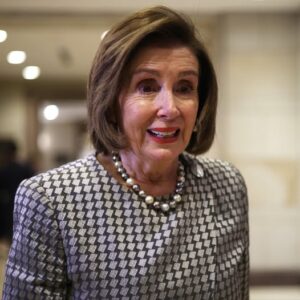Dick Cheney, the powerful and polarizing former vice president under George W. Bush, has died at the age of 84, his family announced in a statement on Sunday. Cheney, often described as one of the most influential political figures of his generation, leaves behind a complicated and deeply consequential legacy that reshaped the United States’ role in the world.
The Cheney family confirmed that the former vice president passed away “due to complications of pneumonia and cardiac and vascular disease.” Cheney had battled heart problems for most of his adult life, surviving five heart attacks, multiple surgeries, and finally receiving a heart transplant in 2012 — an operation he later described as “the gift of life itself.”
“His beloved wife of 61 years, Lynne, his daughters, Liz and Mary, and other family members were with him as he passed,” the family said. “Dick Cheney was a great and good man who taught his children and grandchildren to love our country, and to live lives of courage, honor, love, kindness, and fly fishing.”
“We are grateful beyond measure for all Dick Cheney did for our country,” the statement continued. “And we are blessed beyond measure to have loved and been loved by this noble giant of a man.”
From Wyoming Roots to Washington Power
Born on January 30, 1941, in Lincoln, Nebraska, and raised in Casper, Wyoming, Richard Bruce Cheney’s path to power began humbly. He attended Yale University but dropped out after struggling academically, later completing his degrees at the University of Wyoming.
Cheney’s early political career started during the Nixon administration, where he worked as a congressional intern and later as an aide to Donald Rumsfeld, who would become his lifelong political ally. By his early 30s, Cheney was already a rising star in Washington, known for his discipline, sharp intellect, and mastery of bureaucracy.
He served as White House Chief of Staff under President Gerald Ford from 1975 to 1977, becoming one of the youngest ever to hold that position. After Ford’s defeat, Cheney won a seat in Congress representing Wyoming, where he served for a decade. During his tenure in the House of Representatives, he established himself as a staunch conservative with a deep interest in defense and foreign policy.
Defense Secretary and the Gulf War Architect
When George H.W. Bush was elected president in 1988, Cheney was tapped to serve as Secretary of Defense. In that role, he oversaw the U.S.-led coalition during Operation Desert Storm in 1991, the first Gulf War that successfully expelled Iraqi forces from Kuwait.
Cheney’s steady leadership during that conflict won him respect across the political spectrum, and his approval ratings soared. Yet even then, he showed restraint, advising against a march into Baghdad — a decision he said would have destabilized the Middle East. Ironically, more than a decade later, that same region would again become central to his political destiny.
The Vice Presidency: A New Center of Power
In 2000, Cheney initially led George W. Bush’s search for a running mate but ultimately became the nominee himself. When Bush won the presidency, Cheney took office as the 46th Vice President of the United States, serving from 2001 to 2009.
Following the September 11, 2001 terrorist attacks, Cheney became the intellectual and operational force behind the “war on terror.” He was instrumental in shaping the invasions of Afghanistan and Iraq, as well as the Patriot Act, expanded surveillance powers, and the use of enhanced interrogation techniques — policies critics would later call torture.
For years, Cheney operated as arguably the most powerful vice president in U.S. history. His influence within the Bush administration was unmatched, and his belief in executive authority led to sweeping changes in how the presidency exercised wartime power.
He was unapologetic about his role. In a 2010 interview, Cheney said, “I was prepared to do what I thought was necessary to defend this nation, regardless of the political consequences.”
Controversy and Legacy
While Cheney’s supporters praised his decisive leadership and unwavering focus on national security, his detractors saw him as a symbol of overreach — a man who pushed America into costly wars based on flawed intelligence.
The Iraq War, launched in 2003 under the justification that Saddam Hussein possessed weapons of mass destruction, became a defining and divisive part of his legacy. No such weapons were ever found, and the conflict claimed hundreds of thousands of lives while destabilizing the region for decades.
Still, Cheney defended the decision to the end. “I’d do it again in a heartbeat,” he said in 2015. “The world is better off without Saddam Hussein in power.”
Beyond foreign policy, Cheney also shaped domestic debates — from same-sex marriage (which caused friction with his party when he publicly supported his daughter Mary) to debates over climate change and gun rights.
A Life of Resilience and Determination
Cheney’s health struggles were nearly as legendary as his political career. His first heart attack struck at age 37, and several more followed over the years. By the time of his 2012 heart transplant, many believed his health would not hold out much longer. But in typical Cheney fashion, he defied expectations.
In his memoir, In My Time, Cheney wrote, “Each time I was told the odds, I refused to accept them. Politics taught me to fight — and so did life.”
His recovery after the transplant became a symbol of his relentless willpower. He often credited his wife, Lynne Cheney, for keeping him grounded through decades of public scrutiny and personal health scares.
The two met in high school in Casper, Wyoming, and married in 1964. Their partnership endured more than six decades, marked by love, humor, and shared dedication to public service.
Family and Faith
Cheney’s family remained central to his life. His daughter Liz Cheney followed in his political footsteps, serving as a Republican congresswoman from Wyoming and later becoming a leading critic of Donald Trump after the January 6th Capitol riot.
Despite political differences between father and daughter on some issues, their bond remained strong. In a 2021 interview, Liz described her father as her “greatest inspiration and moral compass.”
His younger daughter, Mary Cheney, has been a vocal advocate for LGBTQ+ rights. When asked about Mary’s marriage to her longtime partner, Cheney broke ranks with many conservatives, saying, “Freedom means freedom for everyone.”
Remembering a Complicated Legacy
Reactions to Cheney’s passing poured in from across the political spectrum. Former President George W. Bush called Cheney “a man of extraordinary loyalty, intellect, and courage,” while critics noted that his policies “changed America in ways still felt today.”
To some, Cheney was a patriot who stood firm in defense of American security during its most vulnerable moment. To others, he was the architect of endless wars and unchecked executive power.
But even his fiercest opponents concede that Cheney’s influence was monumental. He redefined the vice presidency, turning what had often been a ceremonial role into one of real strategic control. His vision for a strong, unyielding America — for better or worse — shaped the post-9/11 era and left an indelible mark on history.
The End of an Era
As the nation reflects on his passing, Cheney’s story serves as a reminder of how complex leadership can be. He embodied the paradoxes of power — fierce loyalty and ruthless ambition, deep patriotism and enduring controversy.
He leaves behind his wife Lynne, daughters Liz and Mary, and several grandchildren. Funeral arrangements have not yet been announced, but the family said private services will be held in Wyoming.
For all his triumphs and controversies, one thing is unde





